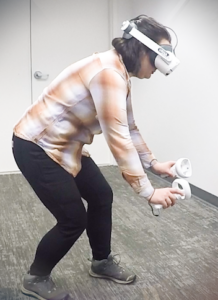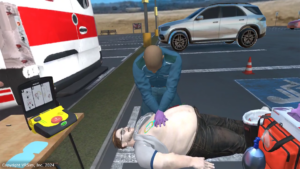
Iowa is facing a critical nursing shortage, with 70% of its medical facilities struggling to find qualified staff and nursing institutions turning away students due to lack of space and instructor availability.
In response, VRSim, a company with operations in Waterloo, aims to address this issue through innovative virtual reality (VR) technology. VRSim’s VR training aims to make nursing training faster, more accessible, and cost-effective, allowing students to practice essential nursing skills in a virtual environment.
VRSim’s initiative, however, required evidence to prove its effectiveness. “We want to be able to affirm that this VR training is advantageous and scientifically effective,” said Maggie Volz, business development and public relations.
“That’s where we come in,” said CIRAS Project Manager Brian Muff.
“CIRAS can connect Iowa companies to Iowa State researchers in almost any area. We are responsible for getting the right people at the table to discuss potential research or testing projects. We ensure that everyone understands the scope, timeline, deliverables, and budget. Finally, we stay involved to ensure that the collaboration is on track,” said Muff.
Muff facilitated a partnership with Iowa State University’s Dr. Richard Stone, who specializes in human augmentation, and collaborated with VRSim to validate the VR training’s benefits. This project, supported by the Iowa Legislature’s Technology Assistance Program (TAP), showcased VR technology’s distinct advantages when combined with traditional training.

The research confirmed VR training’s value, prompting VRSim to consider expanding this technology to EMT programs. This outcome provides a potential pathway for VR in revolutionizing health-care training, highlighting the significance of academia and industry collaboration in tackling workforce challenges.
Maggie Volz of VRSim emphasized the impact beyond gaming. “Our virtual reality is not just about games and cool simulations. It is about jobs and about connecting people with career opportunities by providing them with a safe space to practice skills before entering the workplace.”
This partnership has led to significant sales growth for VRSim’s VR training solutions and paves the way for future projects to transform career training and health-care sector job creation. “Partnering with CIRAS has been a big plus for our company and customers. Their support not only delivered immediate project success but positioned us for long-term strategic gain,” says VRSim President and CEO Matthew Wallace.
For more information, contact Brian Muff at bmuff@iastate.edu or 515-520-1033.